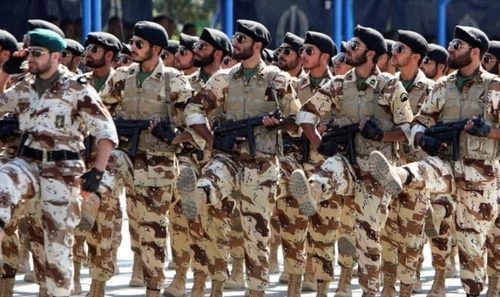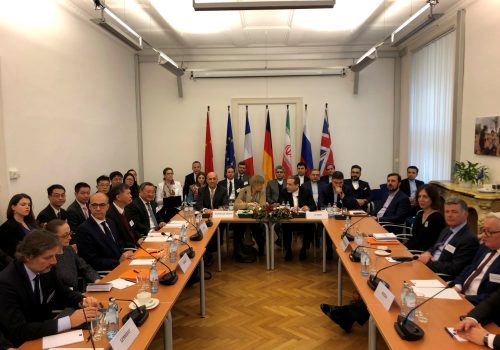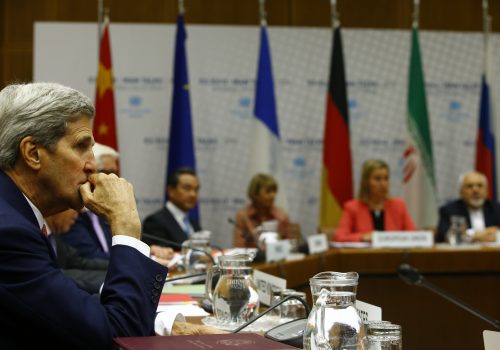July 29, 2020
The tale of an Iranian foreign minister’s rise and fall from grace
Five years ago, Iran and the five permanent members of the UN Security Council plus Germany agreed on the Joint Comprehensive Plan of Action (JCPOA)—an unprecedented nuclear agreement that created an optimistic outlook for the much-tormented relations between Tehran and Washington. However, the era of bilateral détente proved to be short under the crushing weight of four decades of enmity and mistrust. In May 2018, President Donald Trump pulled the US out of the landmark nuclear accord, leaving the deal in a coma.
The dynamics of Iran’s domestic politics have significantly changed since that decision. While President Hassan Rouhani claims that re-imposed US sanctions are the root cause of the economic crisis plaguing the country, Member of Parliament (MP) Nasser Mousavi-Largani argues that sanctions are just an excuse, as many Iranians place most of the blame on the incumbent administration. In fact, the Rouhani administration has broken campaign promises, which has played a role in the severe decline of the moderates in the country.
In this context, Foreign Minister Mohammad Javad Zarif—who has not only had a unique role in implementing the Islamic Republic’s foreign policy, but has also seen a stellar rise due to the landmark nuclear deal—is now experiencing a bitter fall from grace. On July 6, days before the JCPOA’s fifth anniversary, Zarif delivered a speech in parliament, in which MPs called Zarif a “liar” and some even heckled “death to the liar.” Although the parliament is dominated by hardliners, the incident attests to the reality that Zarif’s position in Iran has weakened.
This is surprising given that Zarif was praised both domestically and internationally as one of—if not the—most eloquent and astute diplomats on the world stage. Iranians once placed him on par with the most heroic figures of their history: Arash, a heroic archer of Persian mythology, Amir Kabir, the country’s “first reformer” of the early nineteenth century, and even Mohammad Mossadegh, the ousted prime minister who pushed for Iran’s oil nationalization during the 1950s. Given his initial rise to prominence, some saw Foreign Minister Zarif as a potential future president in Iran—although he never voiced such ambitions.
Zarif lost much of his erstwhile popularity in Iran once the promises of economic benefits trickling down to average Iranians failed to materialize, prompting increased public frustration with the Rouhani administration. This dissatisfaction inevitably accelerated once Trump withdrew from the JCPOA, putting Rouhani’s selling point in shambles. Domestic critics wondered why Iran’s foreign minister had failed to realistically assess the dangers from various US power centers. For instance, in July 2015, Zarif said that, “the next US administration cannot withdraw from the deal and destroy it” in response to his opponents—a forecast that collapsed like a deck of cards once Trump took office.
The aforementioned July 6 episode at parliament was also a stark reminder that Zarif has not only lost his popularity but also his credibility. Sadegh Zibakalam, a Tehran University political science professor, pointed out a contradiction in his performance, stating that “Zarif has been the defender of hardliners in international fora over the last seven years,” adding that, “today’s parliamentary session would be a lesson for Zarif, who has tried to win the hearts of the hardliners.” In his speech, Zarif had defended himself by highlighting his close collaboration with the late Quds Force Commander Qasem Soleimani, stating that the two men had met on a weekly basis.
While Zarif is usually referred to as a moderate, many Iranians believe that he has always played both sides of the fence—appeasing moderates and hardliners—which is seen as a sign of weakness rather than strength for a policymaker of his stature. Consequently, Zarif’s biggest critics come from both camps.
Hardliners believe that Iran’s foreign minister has been a disaster. In fact, they cater to the belief that Zarif has been a kind of “Trojan horse”—meaning that he is a quasi-covert attempt to westernize the system of the Islamic Republic. While Iran’s foreign minister has repeatedly said that the JCPOA has been a national decision with a consensus between all decision-makers, hardliners have perceived the agreement as a product of the Rouhani administration, with the foreign minister assuming key responsibility. They now demand essential members of the Rouhani administration, including Zarif, to apologize for the JCPOA—an agreement hardliners vehemently opposed from the get-go and view as having failed to bring any of the promised benefits.
For instance, hardliners point to the economic crisis that has intensified in Iran. The US dollar has risen from 38,000 rials to 230,000 rials—a near 600-percent increase during the seven years under the Rouhani presidency. In response to the growing economic crisis, the deputy speaker of parliament warned that the chamber will have to determine the limits of Zarif’s diplomacy in order to avoid any more detrimental outcomes for Iran. In this recent parliamentary session, MP Mojtaba Zonnour, the chairman of the Parliament’s National Security and Foreign Policy Committee, stressed to Zarif that “the principal policies of the Islamic Republic of Iran are based on distrust of the US and the West but you turned it upside down. . . Your targets were wrong from the beginning.” After the parliamentary session, Tasnim, a news agency close to the Islamic Revolutionary Guard Corps, wrote that most comments from MPs about the foreign minister’s performance were correct, but that they should not select a radical approach to criticize him. Tasnim News Agency noted that Zarif’s popularity had declined in recent years, explaining that, “radical comments against him would provide an opportunity for Zarif to play the role of the oppressed and thus use them to his favor.” While some hardliners have repeatedly called for impeaching Zarif, others believe he must remain in his position in order to be held accountable.
Among reformists, there is debate over Zarif’s role in Iran’s 2021 presidential election amid widespread concern and uncertainty over the proper candidate for reformists and moderates. The reformists fully supported Zarif during the nuclear negotiations, but now a chasm has emerged between members of this faction. While some reformists still believe that the current Iranian foreign minister has the capability to be the next reformist candidate in the 2021 presidential elections, many have risen up against Zarif. Aftab-e Yazd, a major reformist daily, has written that “Zarif’s credibility is far away from what it was in 2015 because most of the policies that he has pursued have failed and the JCPOA is nearly dead. Thus, Zarif cannot attract people to participate in the [next presidential] election.”
Interestingly, after a freelance journalist floated the idea of Zarif running for office in a tweet, most users disapproved. Mohammad Aghazadeh, a prominent former journalist, replied in a tweet: “Zarif may be a strong negotiator, but he is a weak minister, let alone [a potential] president.” In fact, it is now widely suggested that Iranians will not vote for Zarif.
Although Zarif has denied any intention to run for the presidency, Esmail Gerami-Moghaddam, a top reformist activist, thanked Iran’s foreign minister for his efforts, but emphasized that Zarif is not the reformists’ choice and that their best candidate would be a politician with reformist identity—which Zarif is not. Of course, the foreign minister’s declining popularity cannot be disassociated from the moderate camp’s decline—the faction that has also broken key promises made to Iranians.
These comments indicate the many reasons behind the increasing negative opinions of Zarif, but his political destiny has ultimately always been interlocked with the JCPOA’s fate. With that in mind, his fall from grace cannot be considered apart from the Rouhani administration’s and the larger moderate camp’s loss of credibility in the eyes of many Iranians. As for now, it seems that Zarif himself is aware of his domestic woes, saying that he will likely return to teaching at a university at the end of the Rouhani presidency’s second term.
Ali Fathollah-Nejad is a nonresident Fellow at the Brookings Institution. He is also a senior lecturer in Middle East and Comparative Politics, University of Tübingen. Follow him on Twitter: @AFathollahNejad
Amin Naeni is a non-resident researcher at the Tehran University’s Department of Regional Studies. Follow him on Twitter: @Amin_Naeni
Image: Iran's Foreign Minister Mohammad Javad Zarif attends a news conference following a meeting with Russia's Foreign Minister Sergei Lavrov (not pictured) in Moscow, Russia, December 30, 2019. REUTERS/Evgenia Novozhenina


